Use These 33 Google Search Tricks to Find Exactly What You're Looking For
- Get link
- X
- Other Apps
Google knows everything. Want the weather forecast? Ask Google. Need directions to a restaurant? Search Google. Have a weird rash or wonder why your dog won't stop eating grass? Google it. At your own risk.
In a fraction of a second, Google gives you links to hundreds of millions of answers to your questions—ranging from helpful to absurd. But if you've ever clicked through to the second or third page of search results, you know that basic Google searches will only get you so far. You need advanced Google search tricks to find exactly what you're looking for.
And since Google knows everything, it provides built-in tools to narrow down your search and give you the answers you want without even having to click through to another website. You just need to familiarize yourself with a few—or 33—Google Search tricks.
1. Perform Quick Calculations
Handheld calculators are for mathematicians. Type an equation in the browser address bar (omnibar), and Google will immediately show the result in the search suggestions.

You can also access calculators directly in Google's search results. Search for calculator, tip calculator, or mortgage calculator to get the calculator you need to appear at the top of the search results.
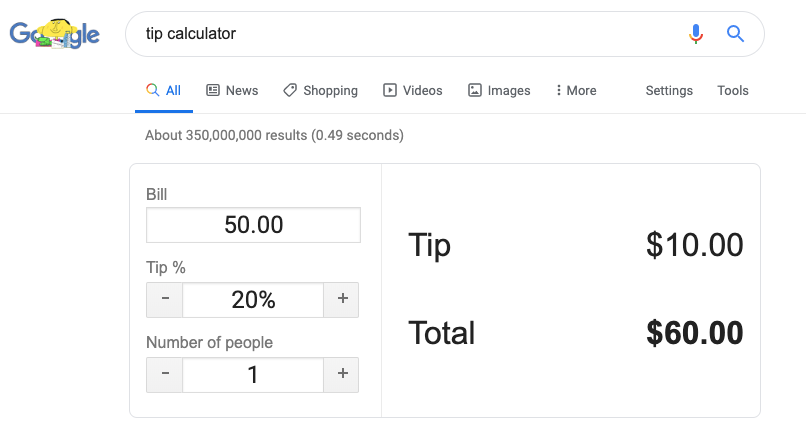
Google even has advanced calculators that can graph functions such as sin and cos—or solve geometry problems such as area of circle with radius of 4.
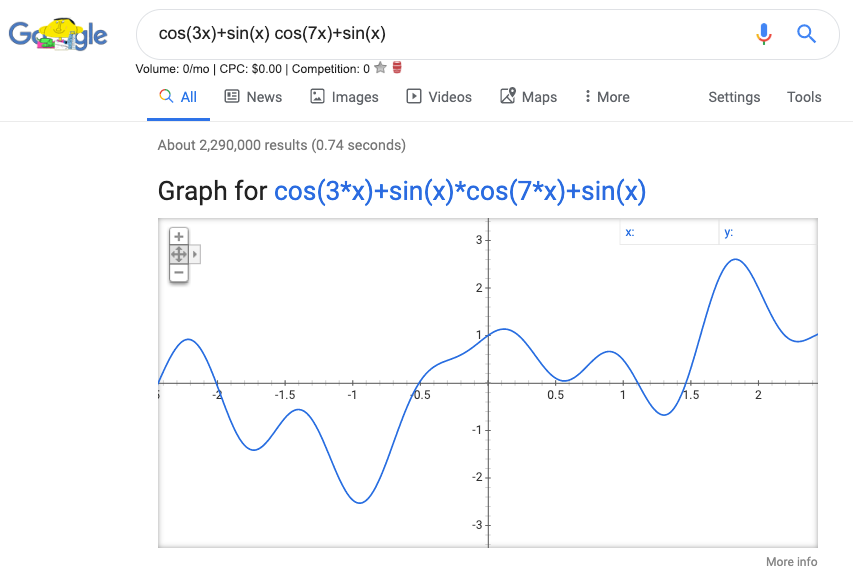
Would have made high school a lot easier.
2. Perform Quick Data Conversions
If you're trying to figure out the weather in another country or need to know how much flour to use when you don't have a small enough measuring spoon, Google has you covered. Search with this formula: [value of first unit] to [second unit].

Conversely, you can search for "unit converter" to populate a conversion calculator in Google's search results. Then, use the dropdown box to select the type of data you're converting.
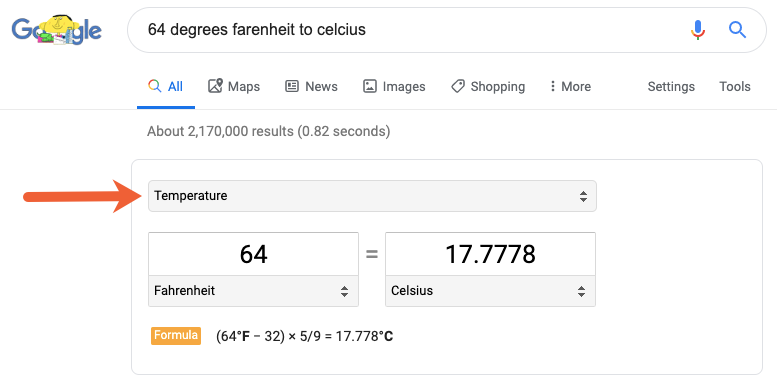
Using Google's unit converter, you can convert:
- Area (for example, square foot to square mile)
- Data transfer rate (for example, kilobyte per second to gigabyte per second)
- Digital storage (for example, megabyte to gigabyte)
- Energy (for example, joule to kilocalorie)
- Frequency (for example, hertz to kilohertz)
- Fuel economy (for example, kilometer per liter to miles per gallon)
- Length (for example, foot to yard)
- Mass (for example, pound to ounce)
- Plane angle (for example, degree to radian)
- Pressure (for example, pascal to bar)
- Speed (for example, miles per hour to kilometers per hour)
- Temperature (for example, Fahrenheit to Celsius)
- Time (for example, second to minute)
- Volume (for example, tablespoon to fluid ounce)
3. Perform Quick Currency Conversions
If you need to convert currency, you can do that in both the omnibar and search results, too. To perform the calculation in the omnibar, use this formula: [value of first unit] to [second unit].

Or type "currency converter" to populate a converter in the search results that lists dozens of convertible currencies.
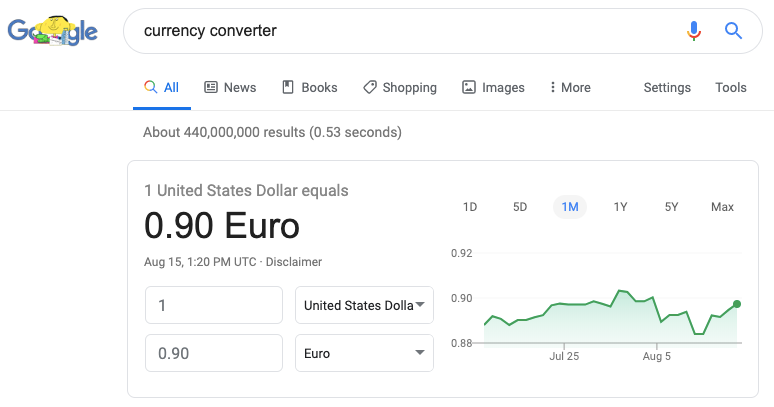
You can even use the tool to convert a few cryptocurrencies like Bitcoin, Bitcoin Cash, Etherium, and Litecoin. Assuming you know what those are.
4. Plan Upcoming Vacations and Business Trips
Search for [city] to [city] to see the cost of flights from multiple airlines:
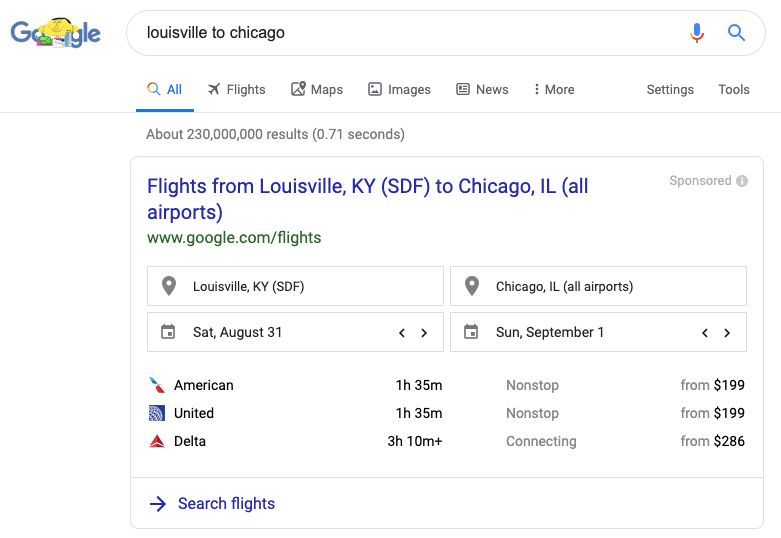
Scroll down the page a little further to see the distance between the two locations and estimated times for the commute if you're driving, taking a bus, walking, or riding a bike.
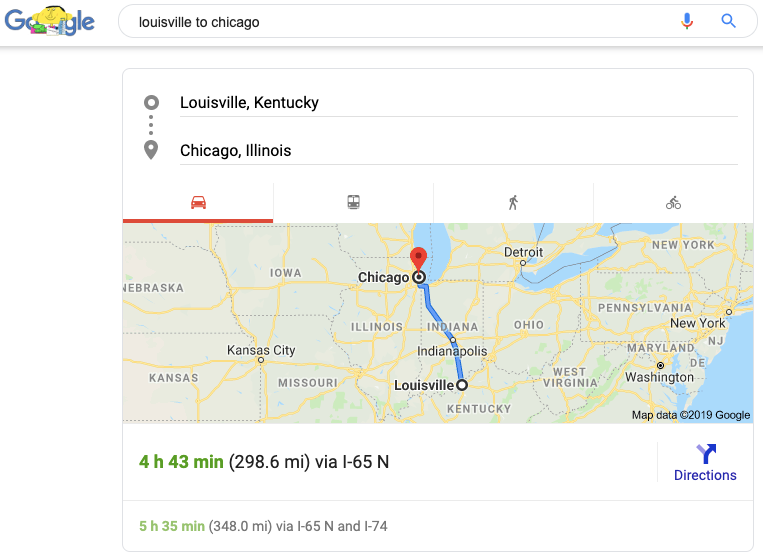
If there's an ocean between where you are and where you want to go, the distance and directions map won't appear. But if you need to know the distance, add the word "distance" to your query (e.g., "New York to London distance") to get the distance in miles (or kilometers, based on your settings) between the two locations.
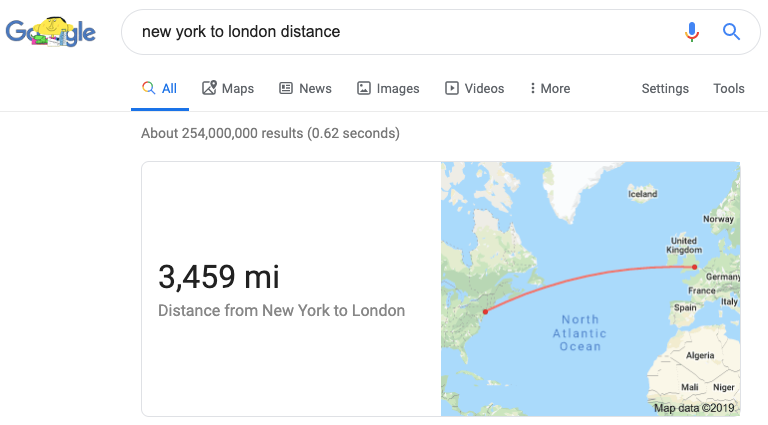
Another helpful Google Search trick for travel is searching for hotels [city] to find hotels and prices:
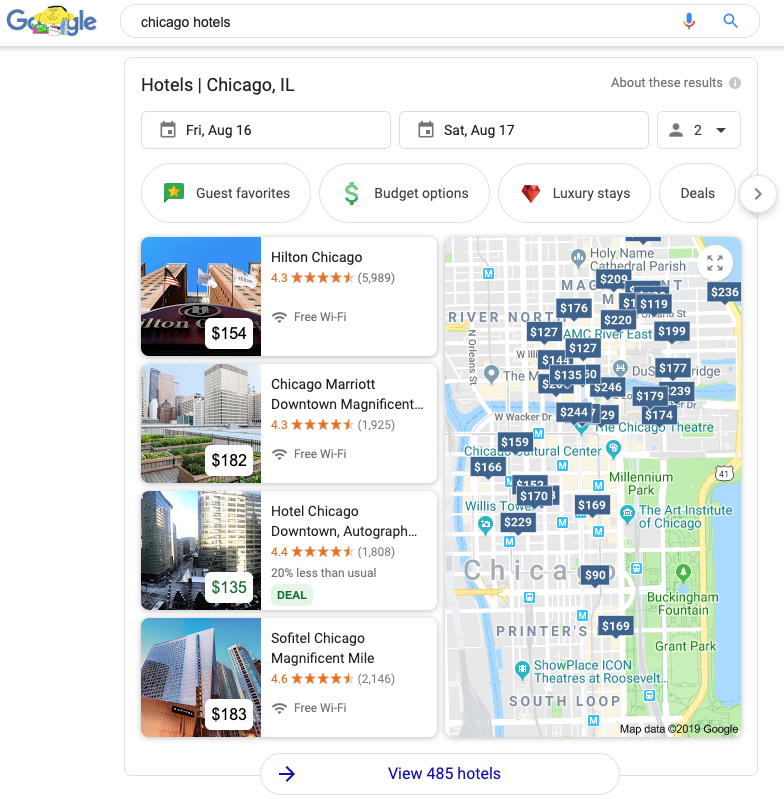
And you can see what events are happening in a city you're traveling to in the next few days, next week, or next month by searching for [city] events.
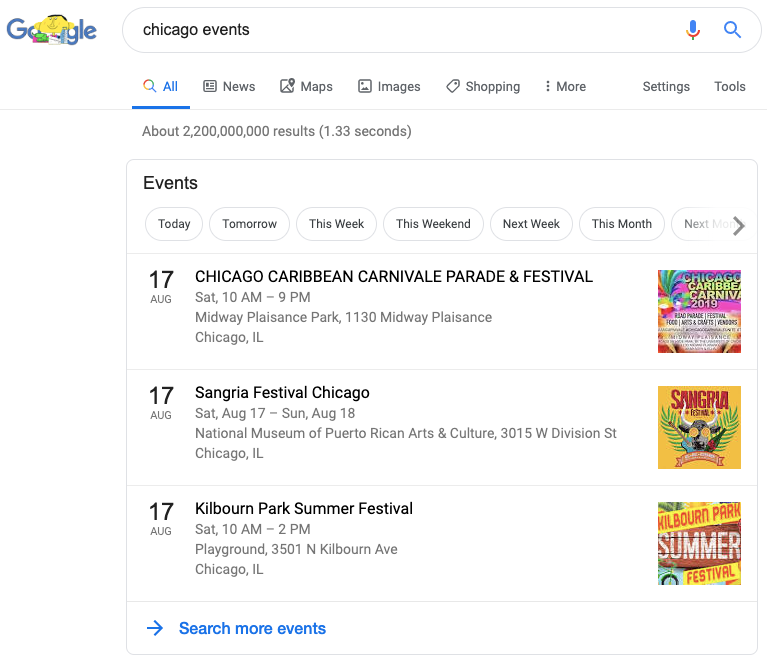
5. See What Time It Is Anywhere in the World
You can search for time in [city] to see what time it is in another city right now, or you can search for [city] to [city] time to see the time difference between where you live and somewhere else.
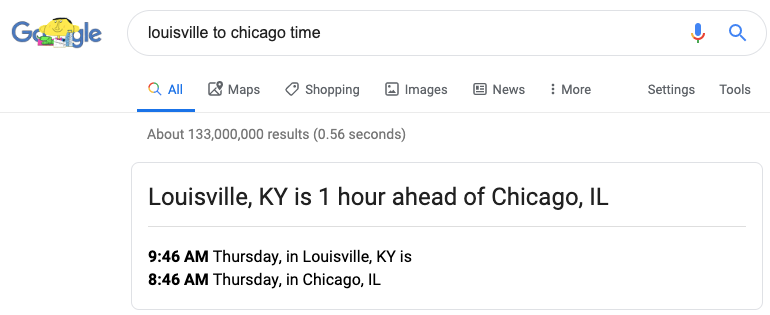
6. Get Customer Support Information
Search for a company's name plus customer service to get the company's customer service phone number.
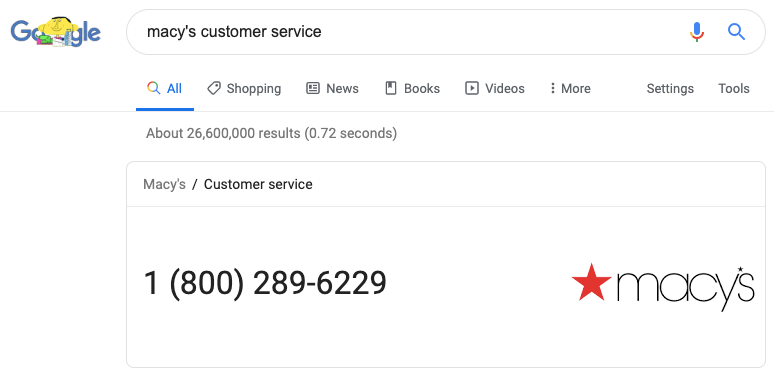
7. Get Word Definitions and Etymologies
Add define before a word or phrase to get a definition of it, or add etymology before a word to see its origins (except for etymology define, which gives you the definition of etymology).
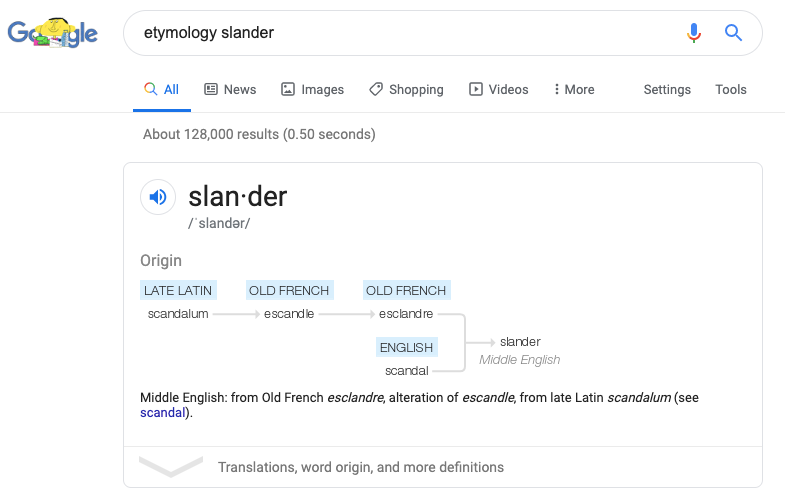
8. Translate Words to Other Languages
And add in [language] after a foreign language word to have Google translate that word into a language you understand.
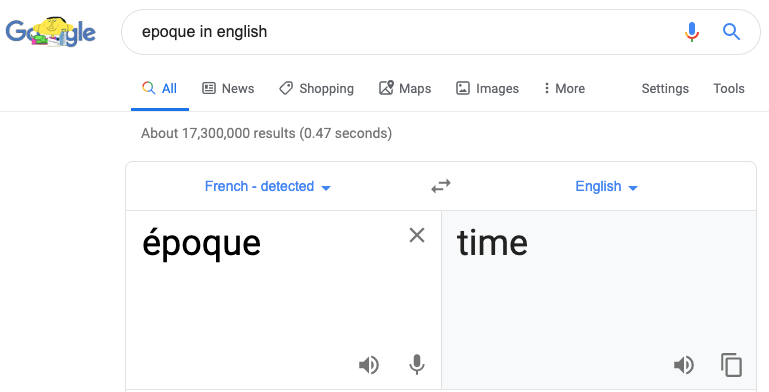
9. Get Current Stock Prices
Enter a stock symbol—such as APPL—into Google to get the current stock price and other financial details.
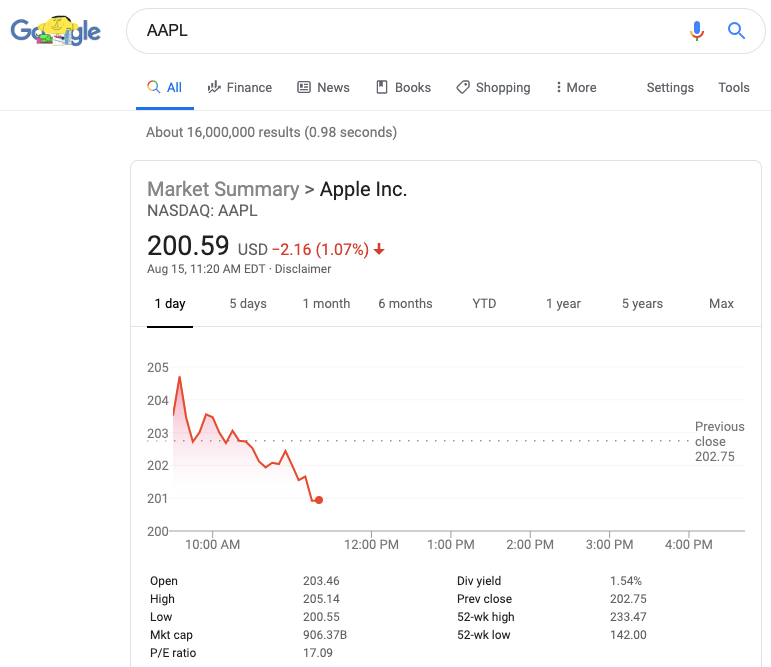
10. Find Out When the Sun Will Rise and Set
Get the time the sun will rise or set in your area by entering sunrise or sunset. You can also add a city name to your search to get the sunrise and sunset times for a different city.
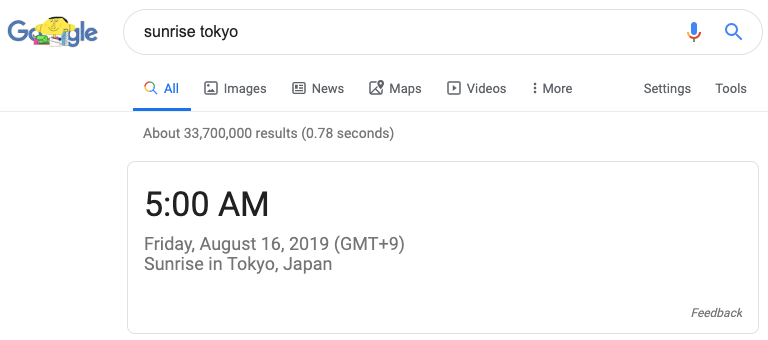
11. Set a Timer or Stopwatch
Enter stopwatch to use a stopwatch in Google Search, or search for set timer for [amount of time] to automatically start a timer.
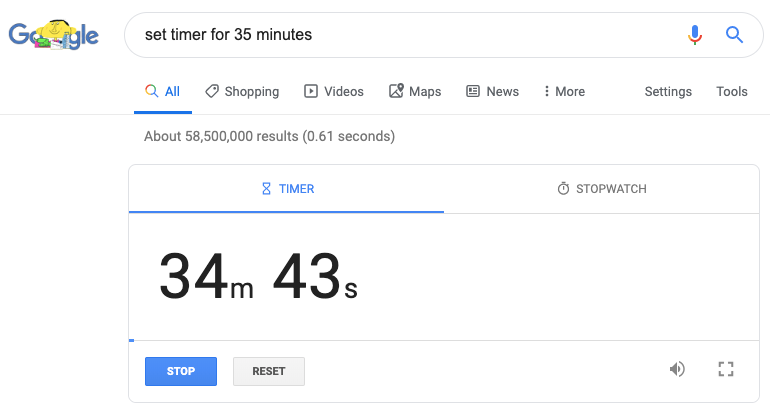
12. Find Your IP Address
If you don't know what your IP address is, search for IP address, and Google will reveal your public IP address.
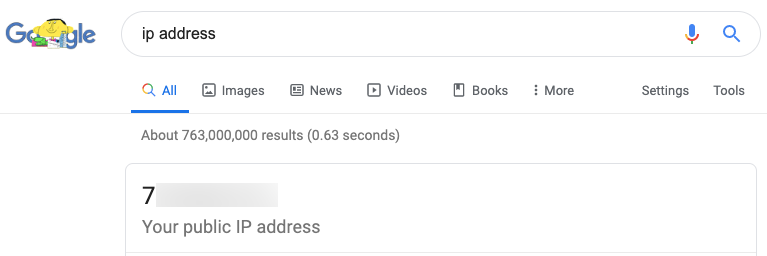
13. Find Your Android Phone
If you can't find your Android phone, enter find my phone to locate it on a map or make it ring. If you believe it's been lost or stolen, you can also secure your device or erase all content from it.
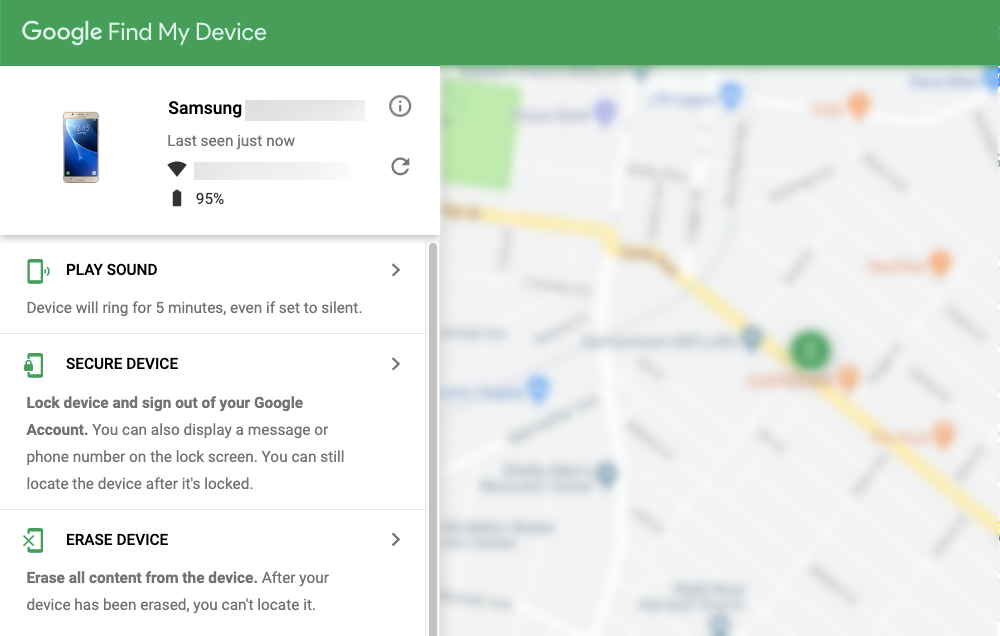
14. See the Dates of Upcoming Holidays
Not sure when Thanksgiving falls this year? Enter the holiday name plus the year to find out its date.
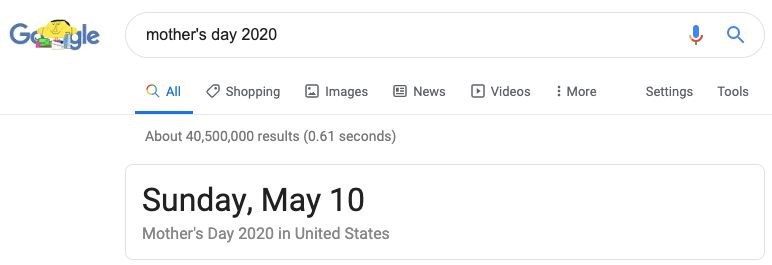
15. Get the Current Weather or See a Weather Forecast
Type weather to see the current temperature in the omnibar and the weather forecast for the week in the search results. If you want to see the weather forecast for an area you're not currently located in, type weather [location].
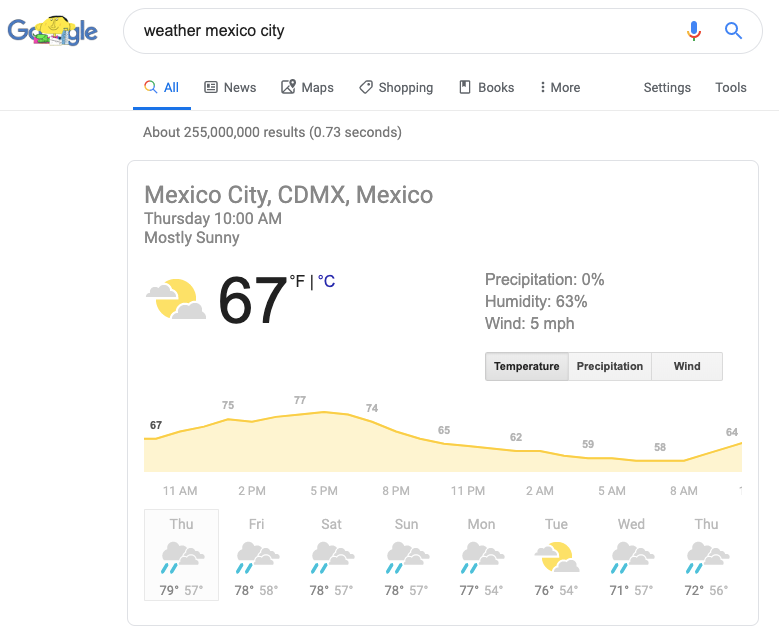
16. Get an Update on a Flight Status
You can find out the status of a flight by searching for the flight number. Bonus: If anyone's emailed you about the flight, it'll populate with that information too.
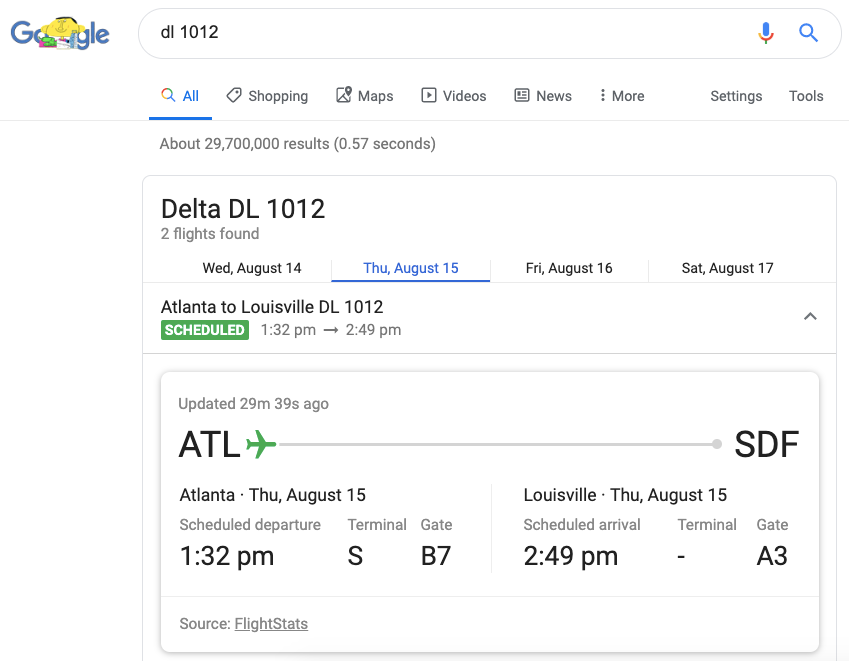
17. Drag and Drop a URL to Open it in a New Tab
If you want to open a webpage you're currently viewing in another tab, highlight the URL and then drag and drop it to a tab position to duplicate the page in a new tab—no cutting and pasting required.
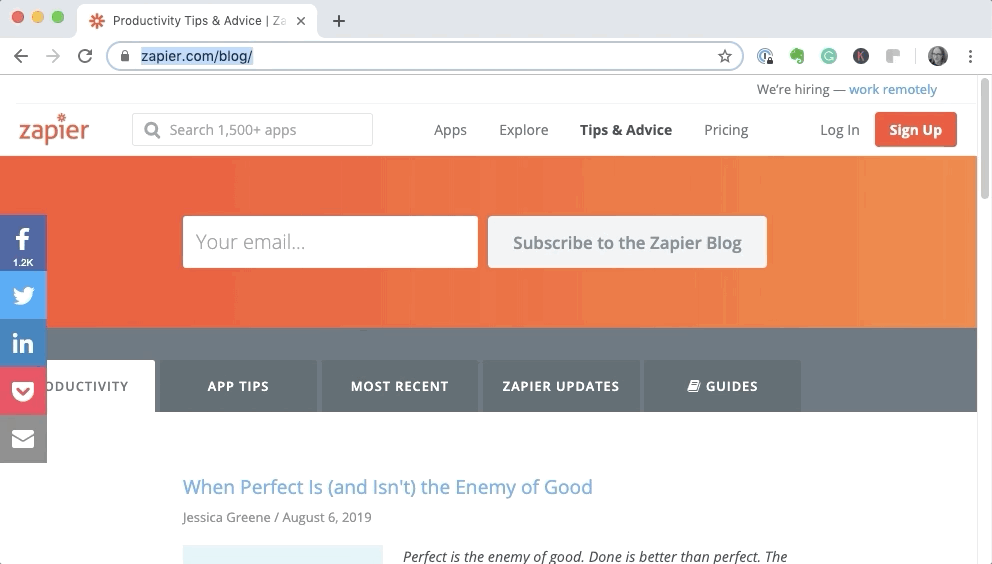
18. Filter Search Results by Type of Information
At the top of every Google Search results page, you'll find tabs to refine your search by category: All, Images, Videos, News, Books, and, under More, Maps, Shopping, Flights, and Finance.
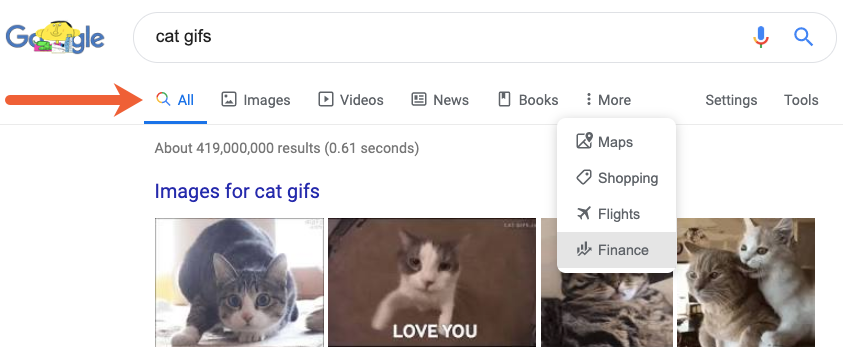
So when searching for cat gifs, for example, I can head to the Images tab to view cat GIFs, or I could go to the Videos tab to watch cat videos. Sadly, there are no cat GIF-related flights.
Editor's note: For the longest time, I always ignored the Shopping tab. What would I find there that I wouldn't find on Amazon or with a standard search? Well, when my diaper bag's zipper broke, I spent an hour trying to find the same, now-discontinued model. No luck. I mentioned it in passing to my brother-in-law, who within three minutes had sent me links to multiple options, each cheaper than I'd originally purchased it for.
19. Narrow Down Search Results by Publish Date
Just below the search bar on the default Google Search results page, you'll see a tab titled Tools. If you click the Tools tab, the navigation bar will expand to display two additional dropdown features: Any time and All results.

Using the Any time tab, you can filter results by when the content was published or updated.
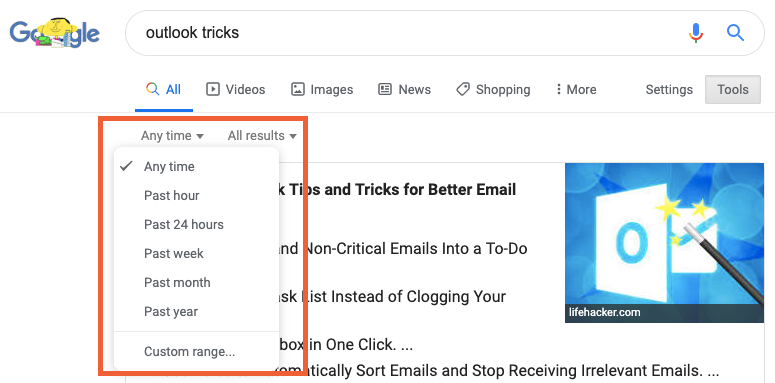
For example, if I check for cat GIFs every day, the Past 24 hours filter will help me find only the newest cat GIFs. If I'm looking for recent research studies, I might apply the Past year filter. And if I'm looking for something very specific and know when it was published, I can use the Custom range filter to find content published within a specified timeframe.
20. Narrow Down Image Results by Image Type
If you're using Google Image Search to find images, the Tools tab lets you filter the results by size, color, usage rights, type (face, photo, clip art, line drawing, or animated), and time (date published). You can also click More > Show sizes to have image sizes listed below images.

If you need an image that's, for example, labeled for reuse and at least 800px wide, these filters can help narrow it down.
21. Narrow Down Video Results by Duration and Quality
You can use the Tools filters in Google Video Search to filter your results by video duration (short, medium, or long), publish date (Any time), quality (filter to show high-quality videos only), and source, as well as by whether or not videos are closed captioned (All videos).

Say you're looking for a video to embed on your blog, but everything you're finding is low-quality and really short. You want something that's high-quality and lengthy. These filters will help you find exactly what you're looking for.
22. View Cached Pages
Next to the URL of each search result, you'll see a dropdown arrow. Click on that to choose to load the cached version of that page—a snapshot of the page as it appeared the last time Google's robots visited that site.

This is useful when a site goes down and you still want to access some of its content.
You can also access the cached version of a page using the cache: search operator; add cache: in front of the URL you want to view, and Google will open the cached version of that page.

23. View Similar Pages
The dropdown next to the URL of any search result also sometimes (but not always) includes an option to find similar pages. Selecting Similar takes you to a list of related sites.

For example, if you select the Similar option on the search result for Mailchimp's homepage, Google will send you to a list of search results for tools like Mailchimp.
24. Only Show Results from a Specific Website
If you use the site: search operator, Google will only show you the results from a specific website. To use the site: search operator, type site:[website address], but don't include http://, https://, or www in the website address. Here's an example:

If you only include the website address in your search, Google will display every result it has indexed for that website. This is helpful if you own a website and want to make sure Google has indexed all of your pages (or if Google has indexed pages it shouldn't have).
But you can also add search terms to your query to look for certain information on that website. For example, if I'm writing a blog post for Zapier and want to link to another Zapier post about the best Kanban apps, I can use the site: search operator plus a search term to find only pages on Zapier that are about Kanban apps.
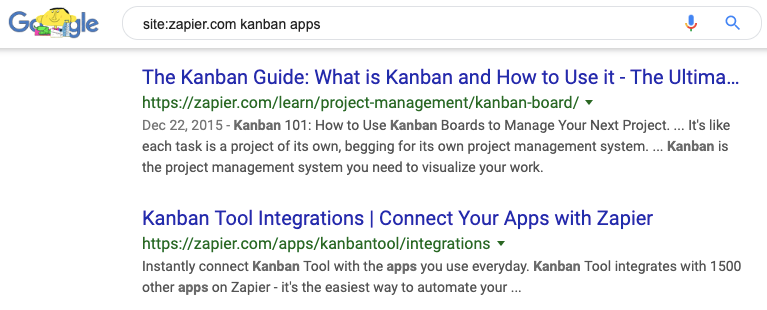
It's also really helpful when you can't find the information you're looking for on a specific website. Instead of clicking through multiple pages trying to find an answer, use the site: search operator and a relevant search term.
25. Create Shortcut Keys in Chrome for Searches You Conduct Frequently
If you find yourself searching for the same thing over and over again, you can create shortcut keys in Chrome to trigger that search with only a few keystrokes.
For example, I often use the site: operator to find content on the Zapier blog, so I have a shortcut key that lets me type a few letters ("ZSS") to trigger that specific search query:

To create shortcut keys in Google Chrome for your commonly used searches, click the three vertical dots at the top-right corner of Chrome, and select Settings.
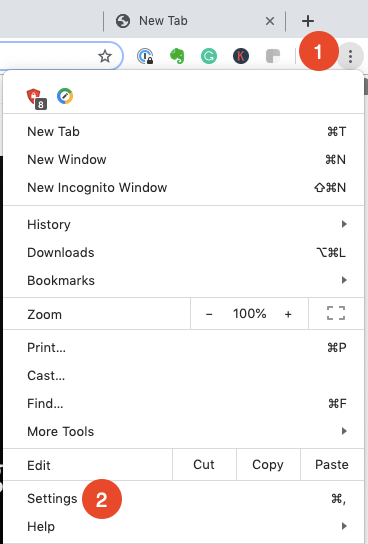
Then click Search engine and select Manage search engines.
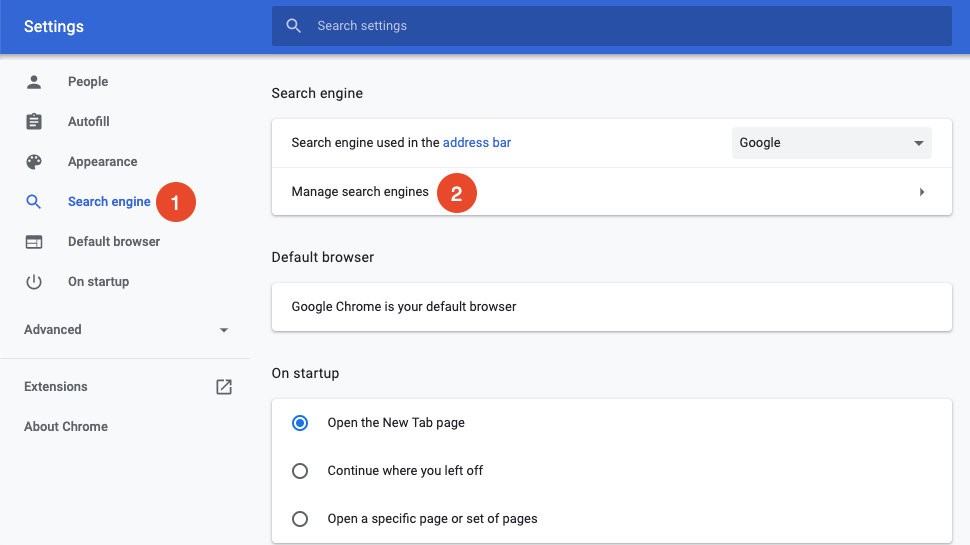
Then click the Add button that's to the right of Other search engines.
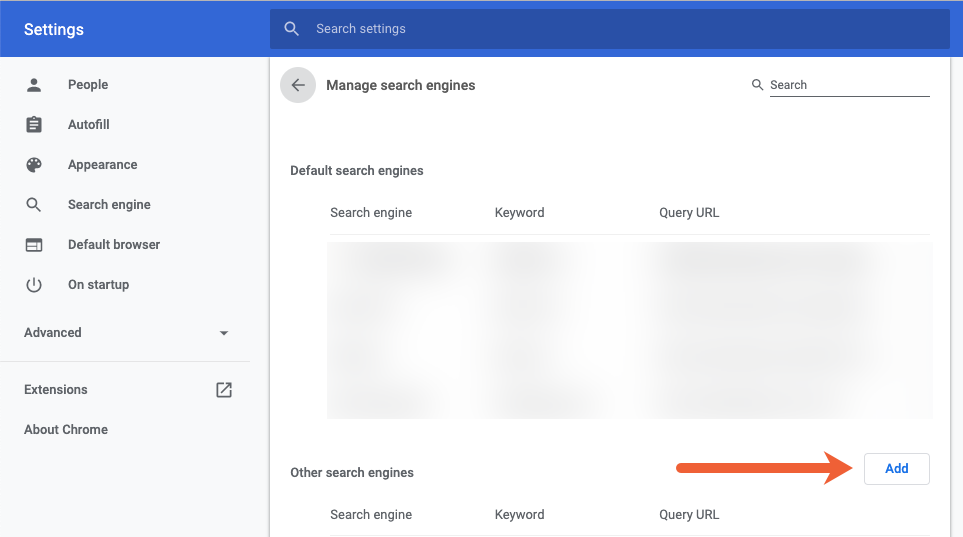
Under Search engine, give your shortcut a name. Under Keyword, enter the shortcut key you want to use to trigger that search. Under URL with % in place of query, enter the search query you want that shortcut to trigger. When you're finished, click the Add button.
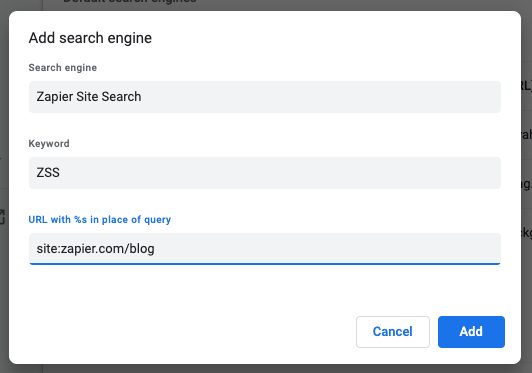
Once you're finished, you can type your shortcut key into Chrome's omnibar and tap Enter/Return to populate the omnibar with your frequently used search.
26. Search Internationally

Normally when you search Google, results are customized to the country Google thinks you're in based on your IP address. If you're in India, for example, you'll be directed to Google.co.in instead of Google.com. If you'd like to get results for other countries, however, you can do that with a couple of tricks.
To use Google.com instead of your local version, visit google.com/ncr and bookmark it for future use. NCR stands for no country redirect.
Alternatively, if you're redirected from Google.com to another Google site, such as Google.co.in, click the "Use Google.com" link at the bottom right corner of the page to get the international version of Google.
Depending on where you are, you might also see an option to search local Google in English, which is handy when you're traveling to places where English isn't the primary language.
27. Search for Sites that Use Specific TLDs
You can also do a country-specific search using the site: search operator plus the TLD for that country. For example, if you want to look for naan recipes and get the information only from sites in India, the search would be naan recipes site:.in.

Here's a list of the TLDs for countries and regions around the world.
You can also use this Google Search trick to search other types of domains, such as government sites (.gov), education sites (.edu), and organization domains (.org).
28. Exclude Specific Sites/Words from Search Results
Following a hyphen - directly with a word is another Google Search operator, and this one tells Google to exclude whatever follows that hyphen from the search results.
For example, if you're looking for remote marketing jobs but don't want to see results from Upwork, you could search for remote marketing jobs -Upwork to tell Google not to show any results with the word "Upwork" in them.

29. Find Only Exact-Match Search Results
If you want to find results that use a very specific phrase, surround your search term in quotation marks to tell Google you only want to see results that use that exact phrase.
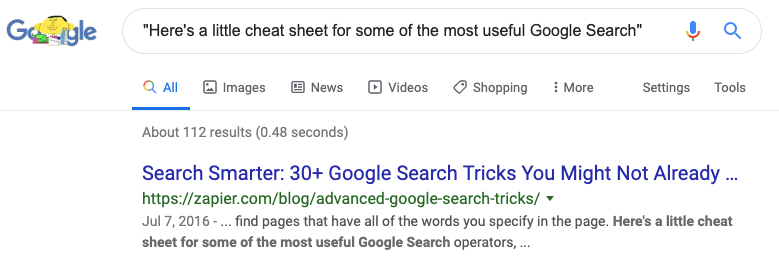
This is helpful on multiple occasions. Maybe you're trying to determine if something is plagiarized. Pick a unique sentence from the text in question and search for it in quotation marks to see if any exact matches show up in search results.
Or say you're trying to find the original source of a statistic you found on a website. Search for that statistic in quotation marks to find other sites citing that exact statistic.
More Google Search operators for narrowing down your search results
Here's a little cheat sheet for some of the most useful Google Search operators, including the ones we've already mentioned:
| Operator | How to Use It | Examples |
|---|---|---|
| * (Asterisk) | Add the asterisk as a placeholder for an unknown word or fact | Find quotes that start with "Life is like a": Life is like a * |
| " (Quotation marks) | Look for an exact word or phrase by putting it in quotes | Find pages that talk about the book One Hundred Years of Solitude: "One Hundred Years of Solitude" |
| - (Hyphen) | Use a hyphen before a word or site to exclude it from your search results | Omit Wikipedia pages from search results: -site:wikipedia.org. Narrow results to the band R.E.M., not rapid eye movement: R.E.M. -sleep |
| .. (Two Periods) | Separate numbers with two periods without spaces to search for numbers within that range | Find phones that cost between $200 and $400: Android phone $200..$400. Find computer milestones that took place between 1950 and 2000: "computer milestones" 1950..2000 |
| allintitle: | Use allintext:[search phrase] to find pages with all of those words in the title of the page | Show pages that have both "Apple" and "notebook" in the title: allintitle:Apple notebook |
| allintext: | Use allintext:[search phrase] to find pages with all of those words in the body of the page | Show pages that mention Roth, IRA, and investments in the body: allintext:Roth IRA investments |
| allinurl: | Use allinurl:[search phrase] to find pages with all of those words in the URL | Show pages that have both "Microsoft" and "Surface" in the URL: allinurl:Microsoft Surface |
| AROUND(n) | Add AROUND(n) between two search terms to find pages where those terms are written on the page in close proximity. The number you choose in place of n sets the maximum distance between the terms. This is useful for finding relationships between two search terms. | Find pages that mention Facebook and Microsoft in the same sentence or paragraph: Facebook AROUND(7) Microsoft |
| site: | Use site:[URL] to limit search results to a specific website | Find pages on Zapier that mention Trello: site:zapier.com trello |
| related: | Use related:[URL] to find sites similar to a specific website | Find websites similar to Zapier: related:zapier.com |
| filetype: | Use filetype:[suffix] to limit results to a certain file format, such as PDF or DOC. | Find keyboard shortcuts for Microsoft Office that are shared as PDF: filetype:pdf office keyboard shortcuts |
| intitle: | Use intitle:[search phrase] to search for pages that have at least one of your search words in the title | Show pages that have "Apple" or "notebook" or both in the title: intitle:Apple notebook |
| intext: | Use intext:[search phrase] to search for pages that have at least one of your search words in the body of the page | Show pages that mention Roth, IRA, and/or investments in the body: intext:Roth IRA investments |
| inurl: | Use inurl:[search phrase] to search for pages that have at least one of your search words in the URL | Show pages that mention Roth, IRA, and/or investments in the body: intext:Roth IRA investments |
| OR | Perform two search queries at the same time by separating your search terms with OR. This will find pages that have one of several words. | Search for pages that reference "Google Drive," "Dropbox," or "OneDrive": "Google Drive" OR Dropbox OR OneDrive |
Also, it's worth noting that you can use as many search operators as you want in a single query. For example, say you wanted to find remote jobs for marketing managers, but you didn't want to see results from Glassdoor because you've already looked at all of the listings there.
You could really narrow down your search results with a multiple-search-operator query like this:

The "-jobs" in this query helps narrow the results down to show only single jobs so that results like "the 20 best sites for remote marketing jobs" don't appear.
30. Use Google's Advanced Search Pages
If you don't want to remember all of those search operators, you have another option. Bookmark Google's advanced search page and use it to narrow your search results instead. You can specify language, region, update time, file type, and more to refine your search queries.
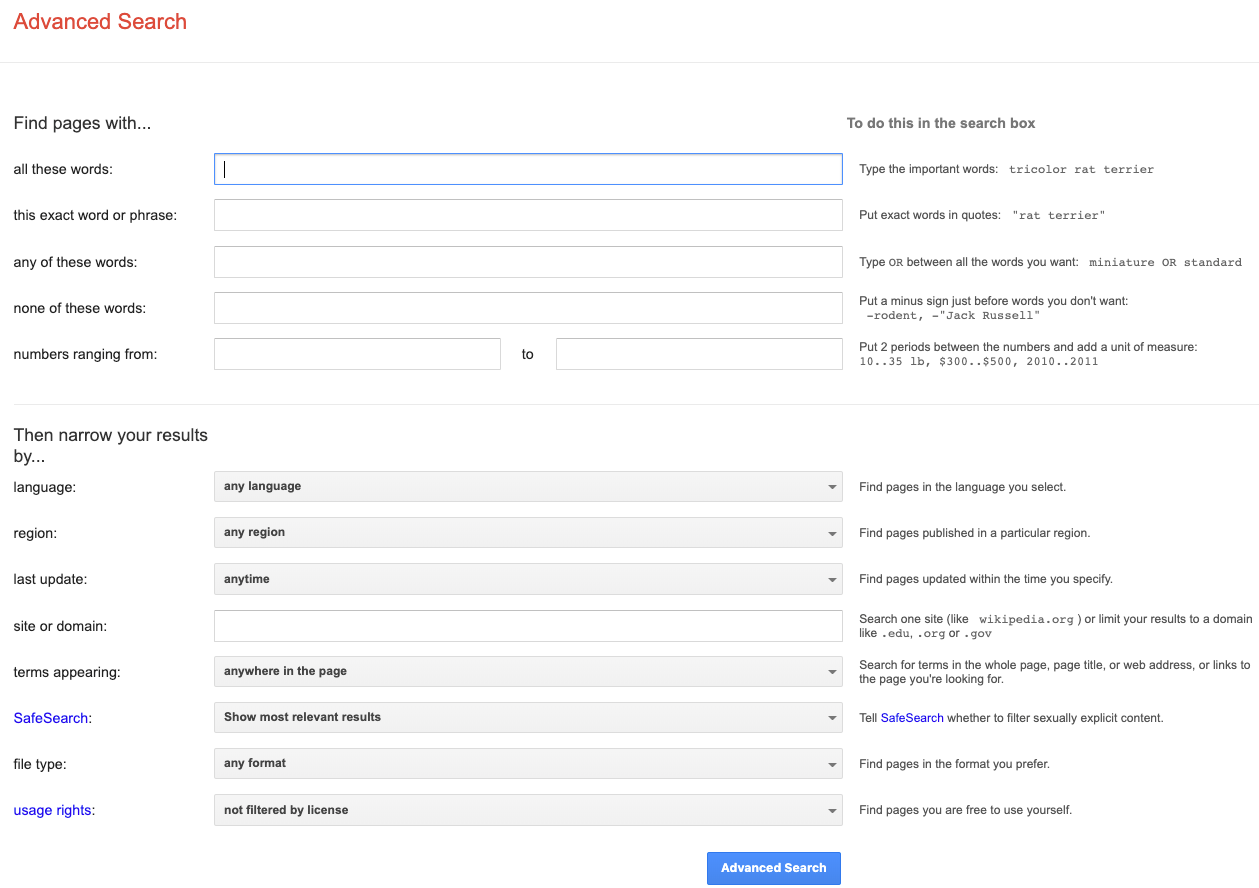
Google also has an advanced search page just for images and one for videos as well.
31. Use Ridiculously Long Search Queries
Often, we use shorthand when we search on Google or type a few words explaining what we're looking for. And Google is really good at interpreting what you need in most cases. But when you're looking for something very specific that's probably not searched for very often, one of the best ways to find what you're looking for is to be long-winded when searching.
Here are a few of the search queries I've used recently that I found in my search history:
- "can Amazon hear everything you're saying on Alexa"
- "80% of customers use directories while researching a product or company"
- "does Moz have an organic traffic estimation tool"
- "how to use UTM codes for email marketing Google Analytics"
- "is there a way to see all questions on a paginated Google Form"
- "video recording tool for Mac that shows your picture alongside a shared screen"
And yes, I've filtered out some of the more embarrassing ones.
When you're searching for something really specific, the more information you give Google, the more likely Google will be to find results that contain the information you're looking for.
32. Use Evernote's Web Clipper to Save Things You Might Want to Reference Later
I can't tell you how much of my life I've wasted looking for things I remember reading at some point but 1) don't know where I saw it and 2) can't remember when I saw it. If you have the same issue, Evernote's Web Clipper is a huge time saver.
When you find a study or article online that you think you might want to reference again later, use the Web Clipper to save that webpage to your Evernote account.
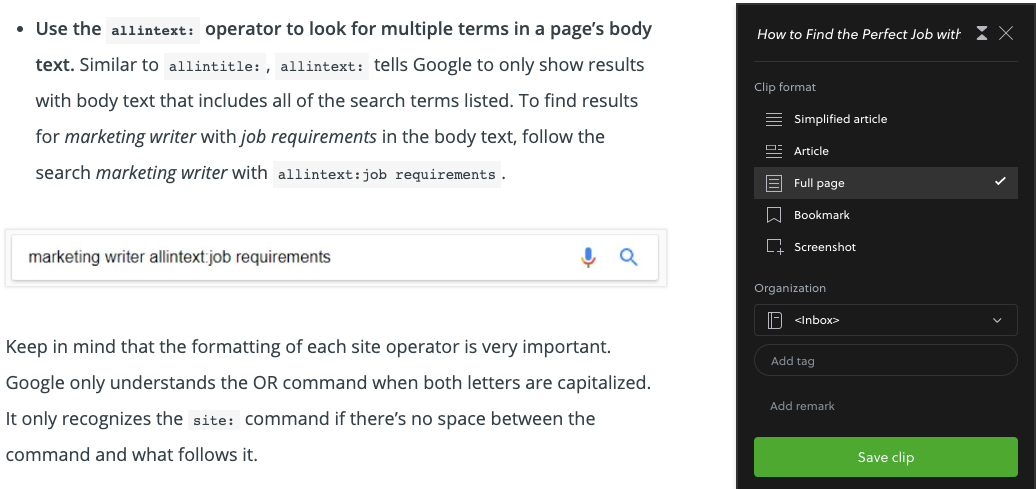
You can then search through your Evernote clips later right from Google's search results. Type a query as you would normally, and if any of your clips in Evernote match that query, you'll see those clips in a side panel of your Google Search results.
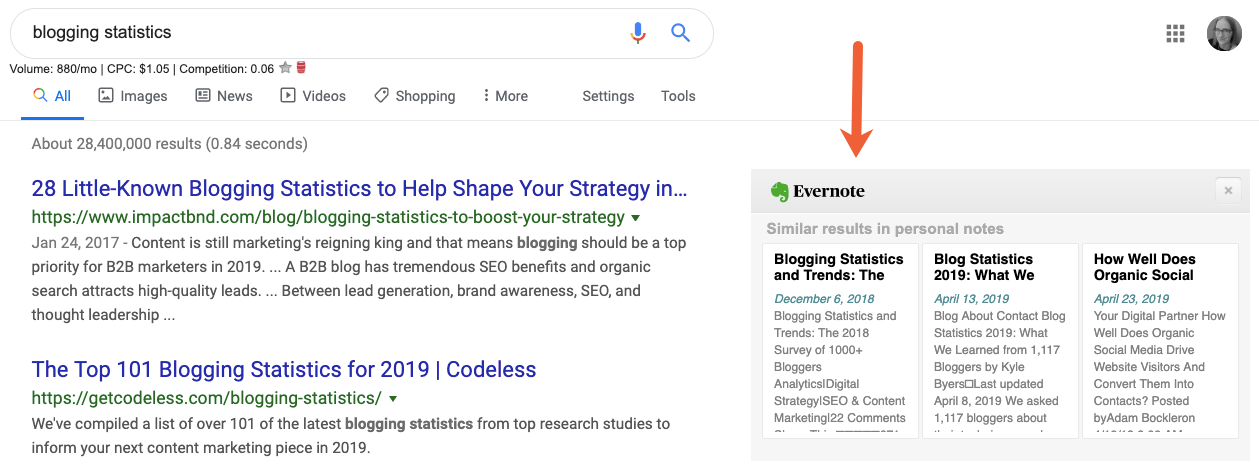
33. Conduct a Reverse Image Search
In addition to searching for images using words in Google Image Search, you can actually search for images using… images.
To search for images with images, open Google Image Search and click the camera icon:
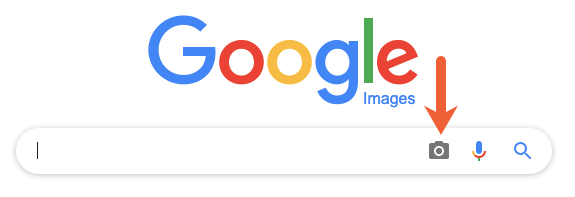
After that, you can search for images by uploading a file or pasting a URL where the image lives.
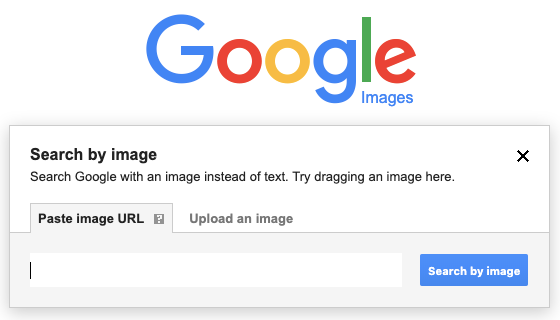
There are multiple reasons why you might want to search for images using images. You might want to see if other sites are using your original images without crediting you. You might need to find the original source of an image so you can reach out and ask if it's okay to use it on your site. Or you might have just taken a picture of something weird and you want to know what it is.
There are no competitions to show off your Google searching skills—and most likely the only people who will be impressed with your abilities are me and you—but you can save yourself time and clicks by mastering these tricks.
Originally published in July 2016, this post has been updated by Jessica Greene to remove references to search tips that are no longer functional and add a few new search tips that weren't included on the original list.
Related reading:
from The Zapier Blog https://ift.tt/29Rosyk
- Get link
- X
- Other Apps
Comments
Post a Comment